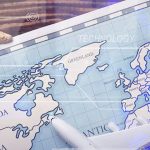Influence of Industrial Metaverse in Travel and Tourism
Once facing the challenges of the COVID-19 pandemic, the travel and tourism industry is now on the path to recovery. As the sector faces transformation, new trends emerge, and innovative technologies take centre stage. Among them, the industrial metaverse stands out as a game-changer, reshaping operational technology and revolutionizing various aspects of travel and tourism.
Despite a 23% decrease in GDP contribution in 2022 compared to 2019, the travel and tourism industry demonstrated resilience, contributing a substantial $7.7 trillion to the global GDP, as reported by Statista. This signals a determined rebound and sets the stage for the industry’s pivotal role in economic recovery worldwide.
Emerging Trends Post-Pandemic:
The aftermath of the pandemic has given rise to intriguing trends, such as “revenge travel.” As lockdowns and restrictions are now behind us, people who saved money during travel restrictions are enthusiastic about spending it on vacations and trips. Moreover, the gradual return to in-person events, along with the growing trend of “workation,” signifies a noticeable shift in how individuals approach both travel and work.
Sustainability Takes Center Stage:
The pandemic has heightened awareness of the environmental impact of tourism, especially among the younger generation. Sustainability becomes a crucial consideration, influencing travel choices and prompting travel companies to offer more eco-friendly options. Regulatory measures like the carbon tax are anticipated to shape travel behaviours, particularly in sectors like cruises, leading to a transition to environmentally friendly propulsion technologies such as Liquified Natural Gas (LNG).
Global Recovery and Challenges:
The United States has swiftly recovered from the pandemic’s impact, with the hotel market witnessing increased bookings. In China, the relaxation of travel restrictions is expected to boost both domestic and international travel and tourism according to Statista. However, challenges persist, with inflation and increased travel costs posing hurdles for the industry.
The Industrial Metaverse: Transforming Travel & Tourism:
To drive both recovery and innovation, industries are embracing advanced technologies. Leading the way in this transformative landscape is the industrial metaverse. Diverging from traditional approaches, it transcends individual devices by envisioning digital twins for entire systems. This groundbreaking concept is poised to redefine travel infrastructure.
Boeing’s Innovations: Boeing, a key player in aviation, deploys Microsoft HoloLens headsets to connect engineers globally, enhancing the design and maintenance of aircraft. The company is aiming for a paradigm shift by building digital twins of both aircraft and production systems. This innovative approach promises improved quality, enhanced safety, and a reduction in manufacturing problems.
Royal Danish Air Force’s Immersive Training: The Royal Danish Air Force collaborates with VR aviation training provider VRpilot to introduce fully immersive training experiences on the ground. Utilizing VR technology, this innovative training aims to reduce pilot training costs. It also provides flexibility for in-flight manoeuvre training on the ground.
Japan Airlines’ VR-Powered Training: Japan Airlines utilizes VR content to train flight crews for in-flight preparation and emergency evacuation drills. With head-mounted displays, dedicated controllers, and voice-recognition software, this VR system simulates daily operations and challenging scenarios, regardless of time and location.
Amsterdam Schiphol Airport’s Smart Asset Management: Amsterdam Schiphol Airport leverages digital twins to monitor and manage assets in real time. The digital twin, known as the Common Data Environment, integrates data from various sources, providing a single dashboard for overseeing assets. This innovative approach enhances predictive maintenance optimization and plant/line operational efficiency, ultimately saving time and money.
Digital Twins Shaping Travel Infrastructure: Another striking example is Virtual Singapore, a digital replica developed by the Singaporean government. This virtual representation acts as a testing ground for policy decisions, urban planning, and experimenting with cutting-edge technologies. In the travel industry, these digital replicas provide insights into optimizing tourist destinations, ensuring sustainable development, and enhancing overall visitor experiences.
The Metaverse’s Role in the Future of Travel:
Integral to the triumph of the industrial metaverse is edge computing, guaranteeing low latency and rapid network speeds. Within the realm of travel and tourism, this becomes crucial, facilitating the delivery of seamless and immersive experiences. In these instances, metaverse-driven virtual tours provide a seamless experience, allowing tourists to actively engage, make informed decisions, and enhance their travel experience with a personalized touch.
Conclusion:
In the quest for recovery, the travel and tourism industry finds a valuable ally in the industrial metaverse. It creates digital twins, and integrates AI, machine learning, and edge computing, ensuring unmatched operational efficiency. In the post-pandemic era, with a focus on safety, sustainability, and seamless experiences, the industrial metaverse transforms the travel landscape. This journey towards revitalization is guided by the technological marvel—a game-changer shaping the future of travel.
AVIANET helps you bridge the gap between travel and digitalisation. Learn more about our metaverse and other services:
Advantages of virtual tours in the tourism industry.

